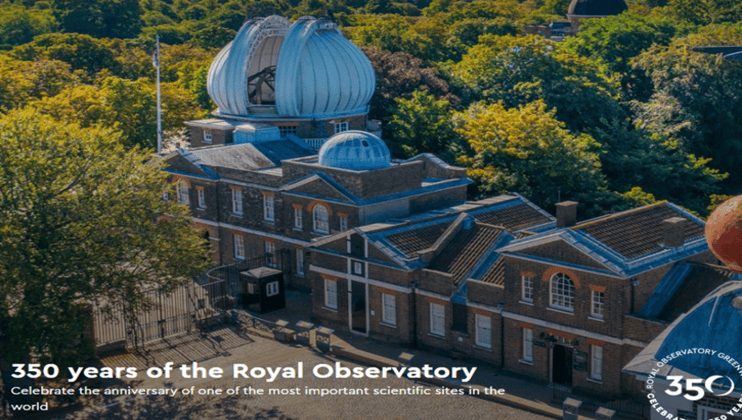The Royal Observatory 350th Anniversary
2025 marks 350 years since the foundation of the Royal Observatory, the first state-funded, purpose-built scientific institution in Britain.

The Royal Observatory Greenwich celebrates its 350th anniversary in 2025. Founded in 1675 by Charles II to solve longitude and improve navigation at sea, it is now one of the most important scientific sites in the world. It is the home of Greenwich Mean Time, the Prime Meridian and the UK’s largest refracting telescope. The Observatory galleries and Peter Harrison Planetarium, London’s only planetarium, help unravel the extraordinary phenomena of time, space and astronomy.
350 years of pioneering research will be celebrated throughout 2025. Events will correspond to important moments in the Observatory’s development, acknowledging the extraordinary astronomers who worked there in the past, as well as the curators and astronomers who work there today.
The season of events kicks off in March 2025 under the theme of ‘People Stories’. Inspiring stories of iconic women including Alice Everett, Elsie Clack and Mary French will be told in a special talk on 28 March. Researchers from the US and Australia will join Dr Louise Devoy, Senior Curator of the Royal Observatory, to discuss the legacy of the first generation of professional female astronomers at the Royal Observatory and observatories around the world.
On 29 March, a partial solar eclipse will be live streamed from the Royal Observatory Greenwich. This will start a solar season of activities in April. As part of the season, the life of pioneering nineteenth-century Astro photographer Annie Maunder will be showcased in a special planetarium show on her birthday, 14 April. Starstruck: Sun will explore our closest star and the contributions Annie Maunder made to our understanding and study of the Sun.
In August, a new planetarium show will demonstrate the night sky when the foundation stone was laid in Greenwich Park. Visitors will have the opportunity to discover the astronomical sights they can spot for themselves today, and how our knowledge and views of these have evolved over time.
Throughout this landmark year, there will also be special events including live science and stargazing demonstrations, family activities, talks and daily historic tours.
Further Information visit: www.rmg.co.uk/350